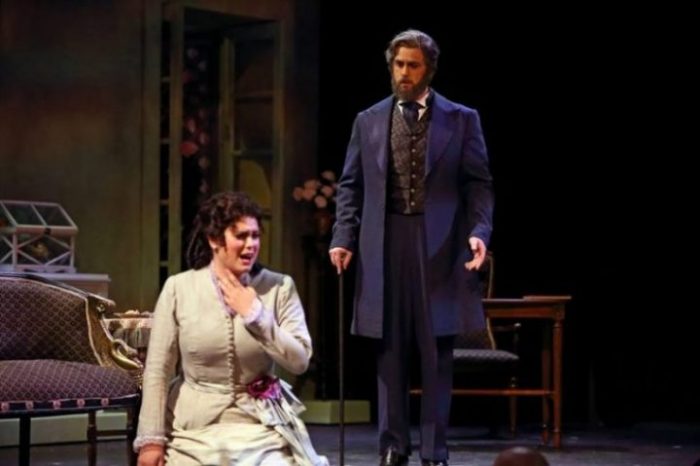
La Traviata by Verdi. Academy of Vocal Arts, Philadelphia, April-May 2018.
As Violetta lays dying from tuberculosis, she sings “In me rinasce, m’agita insolito vigore; io ritorno a vivere” (“I am revived, unusual energy invigorates me, I return to life.”)
Thus did La Traviata return this week in a new Academy of Vocal Arts production conducted by Christofer Macatsoris and directed by Jeffrey Marc Buchman. The old classic regained life because the production adhered to what the composer put in his manuscript.
The drama is heart-rending when you follow the score by Giuseppe Verdi and the words of Francesco Maria Piave. Without gimmicks, the music and the staging gripped us as its creators intended. The tempi had momentum while orchestral textures were unusually lyrical and tender. The accompaniment often sounded like chamber music, with beautiful solos contributed by violinist Igor Szwec and oboist Geoffrey Deemer.
That’s fitting for this intimate story (adapted from an Alexandre Dumas play) about a courtesan who discovers true love with a young man whose family feels disgraced as long as she remains in a relationship with him. Compared to almost all other Verdi operas, La Traviata has no royalty, no soldiers, no crowd scenes — everything takes place in peoples’ homes. The story had personal resonance for Verdi who, after the death of his young wife, started living with a woman who had several illegitimate children, thus causing a scandal.
La Traviata includes hit tunes for each of its leads, but some of the greatest thrills come during dialogues, as when Violetta tells Alfredo how, after her death, he should get married while she looks down from heaven and blesses them. Such moments tear your heart out. AVA’s young cast gave thoroughly professional performances. Alexandra Razskazoff, a first year resident artist, epitomizes what’s special about this school. Razskazoff already has a bachlor’s degree from the Peabody Conservatory and a master’s from The Juilliard School, and then auditioned for admission to AVA. This was her first performance as Violetta, the meatiest role she’s yet assumed, and she handled it with finesse, indicating superb training. She has a full, rich sound yet had no trouble with coloratura and the optional high E-flat just before the end of Sempre libera. She also scaled down to fine pianissimi in her death scene.
(Too many Violettas are lightweights who lack the necessary power for “Amami, Alfredo” while others run into difficulty with the coloratura. Razskazoff was fine in both areas.)
Roy Hage, a tenor whom I previously saw as Tamino in Zauberflote and the Duke in Rigoletto, has developed nicely and sang an ardent Alfredo with hefty squillo (ping) in his voice. Timothy Renner played a distinguished Germont whose voice rang out in Di Provenza il mar and its cabaletta.
Macatsoris revived cabaletti that sometimes have been cut from this opera, and also restored a meaningful musical section between the two times Violetta sings “Gran Dio” (“Dear God; To die so young!”) While maintaining Verdi’s tempi, Macatsoris does allow the music to expand in climactic moments, and all of the singers are well-trained to breathe and shape phrases in synch with the orchestra.
Buchman’s staging is simple and traditional. When Alfredo loses his temper and uses his gambling winnings to pay Violetta back for her supposed unfaithfulness, he does so without the over-the-top throwing of cash at her as many other productions have done.
Val Starr’s costumes for the Germonts, father and son, are aptly elegant as befitting a socially-prominent family. At home with Violetta in act 2, Alfredo wore a grey top hat and white dinner jacket. (No flashy underwear as in Willy Decker’s Salzburg production of 2005 which has just finished an eight-year run at the Metropolitan.)
Alternate casts are performing in the production as it plays in Montgomery and Bucks counties as well as the Helen Corning Warden Theater in downtown Philadelphia.